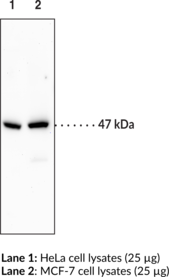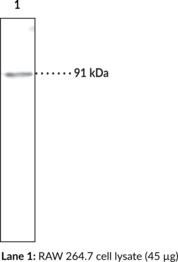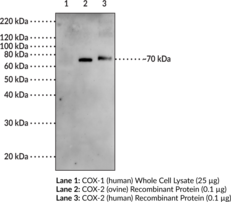Description
α-Enolase, also known as enolase 1, is a glycolytic enzyme that catalyzes the conversion of 2-phosphoglycerate to phosphoenolpyruvate.{42086} It is ubiquitously expressed in human tissues, including liver, spleen, kidney, and brain. In cells, α-enolase is primarily localized to the cytoplasm, however, an alternatively translated form localizes to the nucleus and lacks glycolytic enzyme activity.{42086,42087} α-Enolase also functions as a cell surface receptor for plasminogen on pathogens and activated immune cells, as an oxidative stress protein in endothelial cells, and as a chromatin binding partner to facilitate transcription.{42087,42088,42089} The ENO1 promoter contains a hypoxia-response element, allowing α-enolase to facilitate aerobic glycolysis and contribute to the Warburg effect in tumor cells.{42087} α-Enolase is overexpressed in multiple tumors, including glioma, neuroblastoma, pancreatic, prostate, and hepatocellular carcinomas. Its role as a plasminogen receptor facilitates extracellular matrix degradation and cancer invasion.{42089} α-Enolase is an autoantigen in asthma, Hashimoto’s encephalopathy, and rheumatoid arthritis, and has been found in the serum of pediatric patients with juvenile idiopathic arthritis.{42090,42091,42092,36062} Cayman’s α-Enolase Polyclonal Antibody can be used for Western blot and ELISA applications. The antibody recognizes α-enolase at ~47 kDa from human samples.
Synonyms: ENO1|Enolase-1|MBP-1|MPB-1|NNE|Non-Neural Enolase|Phosphopyruvate Hydratase|Plasminogen-Binding Protein
Immunogen: Full length recombinant human α-enolase
Formulation: 250 µg of protein A-purified antibody
Isotype:
Applications: ELISA, IHC, and WB
Origin:
Stability: 365 days
Application|ELISA||Application|Immunohistochemistry||Application|Western Blot||Product Type|Antibodies|Polyclonal Antibodies||Research Area|Cancer|Cell Migration & Metastasis||Research Area|Cancer|Metabolism||Research Area|Endocrinology & Metabolism|Carbohydrate Metabolism||Research Area|Immunology & Inflammation|Autoimmunity|Rheumatoid Arthritis||Research Area|Immunology & Inflammation|Innate Immunity||Research Area|Immunology & Inflammation|Pulmonary Diseases|Asthma||Research Area|Infectious Disease



